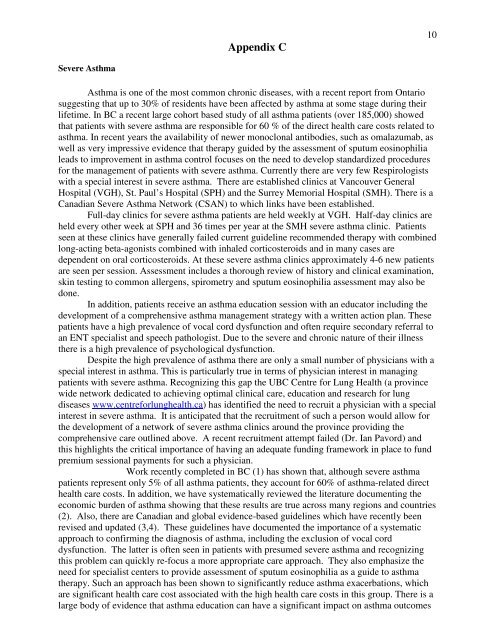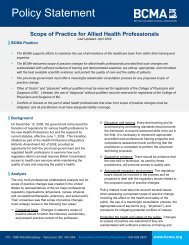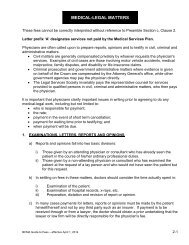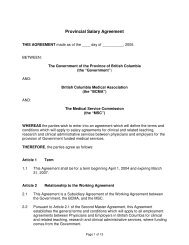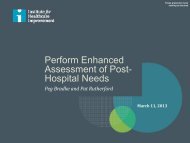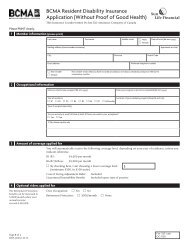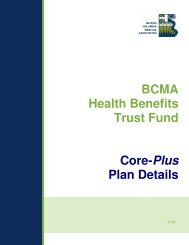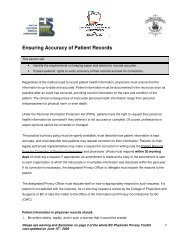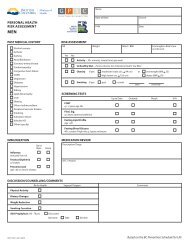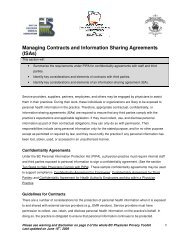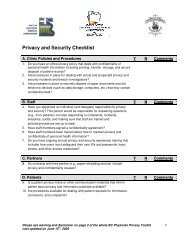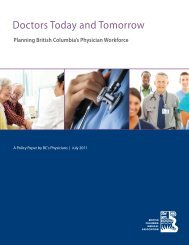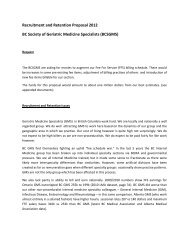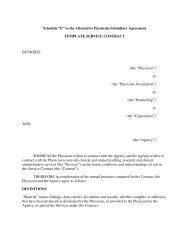Respiratory Medicine - British Columbia Medical Association
Respiratory Medicine - British Columbia Medical Association
Respiratory Medicine - British Columbia Medical Association
You also want an ePaper? Increase the reach of your titles
YUMPU automatically turns print PDFs into web optimized ePapers that Google loves.
Appendix C10Severe AsthmaAsthma is one of the most common chronic diseases, with a recent report from Ontariosuggesting that up to 30% of residents have been affected by asthma at some stage during theirlifetime. In BC a recent large cohort based study of all asthma patients (over 185,000) showedthat patients with severe asthma are responsible for 60 % of the direct health care costs related toasthma. In recent years the availability of newer monoclonal antibodies, such as omalazumab, aswell as very impressive evidence that therapy guided by the assessment of sputum eosinophilialeads to improvement in asthma control focuses on the need to develop standardized proceduresfor the management of patients with severe asthma. Currently there are very few Respirologistswith a special interest in severe asthma. There are established clinics at Vancouver GeneralHospital (VGH), St. Paul’s Hospital (SPH) and the Surrey Memorial Hospital (SMH). There is aCanadian Severe Asthma Network (CSAN) to which links have been established.Full-day clinics for severe asthma patients are held weekly at VGH. Half-day clinics areheld every other week at SPH and 36 times per year at the SMH severe asthma clinic. Patientsseen at these clinics have generally failed current guideline recommended therapy with combinedlong-acting beta-agonists combined with inhaled corticosteroids and in many cases aredependent on oral corticosteroids. At these severe asthma clinics approximately 4-6 new patientsare seen per session. Assessment includes a thorough review of history and clinical examination,skin testing to common allergens, spirometry and sputum eosinophilia assessment may also bedone.In addition, patients receive an asthma education session with an educator including thedevelopment of a comprehensive asthma management strategy with a written action plan. Thesepatients have a high prevalence of vocal cord dysfunction and often require secondary referral toan ENT specialist and speech pathologist. Due to the severe and chronic nature of their illnessthere is a high prevalence of psychological dysfunction.Despite the high prevalence of asthma there are only a small number of physicians with aspecial interest in asthma. This is particularly true in terms of physician interest in managingpatients with severe asthma. Recognizing this gap the UBC Centre for Lung Health (a provincewide network dedicated to achieving optimal clinical care, education and research for lungdiseases www.centreforlunghealth.ca) has identified the need to recruit a physician with a specialinterest in severe asthma. It is anticipated that the recruitment of such a person would allow forthe development of a network of severe asthma clinics around the province providing thecomprehensive care outlined above. A recent recruitment attempt failed (Dr. Ian Pavord) andthis highlights the critical importance of having an adequate funding framework in place to fundpremium sessional payments for such a physician.Work recently completed in BC (1) has shown that, although severe asthmapatients represent only 5% of all asthma patients, they account for 60% of asthma-related directhealth care costs. In addition, we have systematically reviewed the literature documenting theeconomic burden of asthma showing that these results are true across many regions and countries(2). Also, there are Canadian and global evidence-based guidelines which have recently beenrevised and updated (3,4). These guidelines have documented the importance of a systematicapproach to confirming the diagnosis of asthma, including the exclusion of vocal corddysfunction. The latter is often seen in patients with presumed severe asthma and recognizingthis problem can quickly re-focus a more appropriate care approach. They also emphasize theneed for specialist centers to provide assessment of sputum eosinophilia as a guide to asthmatherapy. Such an approach has been shown to significantly reduce asthma exacerbations, whichare significant health care cost associated with the high health care costs in this group. There is alarge body of evidence that asthma education can have a significant impact on asthma outcomes


